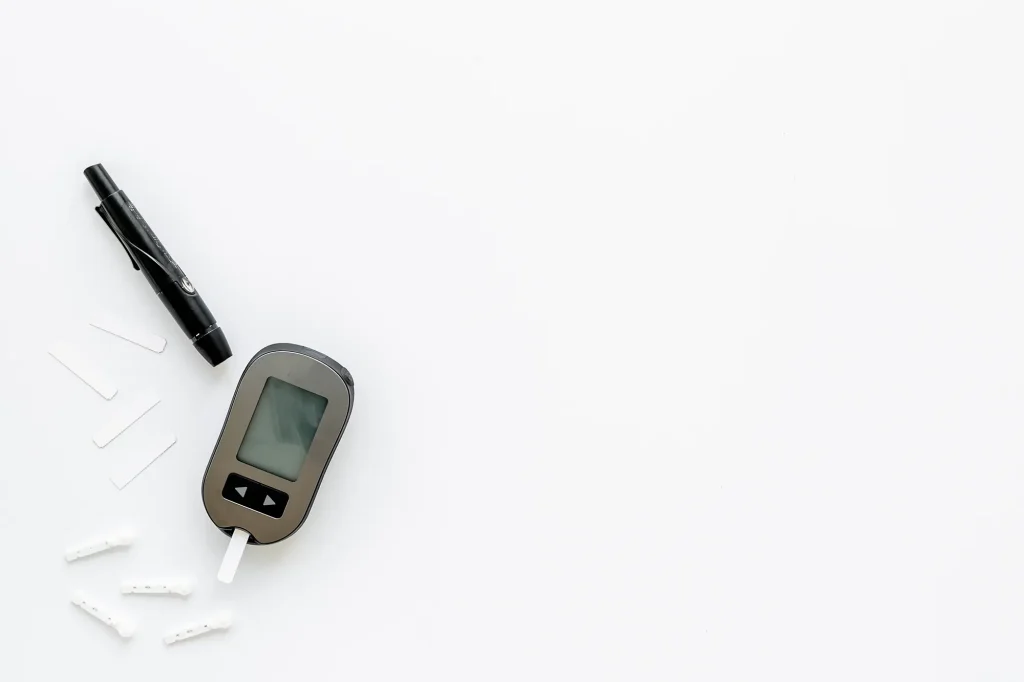Monitor levels | Reduce carbohydrate intake | Consume adequate carbohydrates |
Maintain moderate weight | Control portion size | Exercise regularly | Hydrate | Try herbal extracts | Manage stress | Get enough sleep.
People living with diabetes must manage their blood sugar, or glucose, levels. Monitoring glucose levels, exercising regularly and following a diet plan approved by a doctor can help keep sugar levels in the target range.
High blood sugar, known as hyperglycemia, occurs when a person’s blood sugar level exceeds 180 milligrams per deciliter (mg/dL). People with diabetes control their blood sugar levels to keep them within the range specified by their doctor.
Without prompt management, hyperglycemia can lead to short- and long-term complications.
Strategies for achieving this goal include monitoring blood sugar levels, limiting carbohydrate intake and maintaining a moderate weight.
In this article, we’ll look at the different ways to lower high blood sugar levels. We will also explain why it is important and how long it takes.
Closely monitor blood sugar levels
High blood sugar usually refers to levels above 180 mg/dL. However, a person may not experience symptoms of diabetes until levels exceed 200 mg/dL. Therefore, it is important for a person with diabetes to check their blood sugar levels several times a day. This should mean that blood sugar levels never reach excessively high levels.

A person with diabetes can use a home glucose monitor to check their blood sugar levels. One option is a continuous glucose monitor, which is a medical device that makes it easy to check blood sugar levels.
The recommended number of glucose measurements per day will vary from person to person. Your doctor can make the best recommendations for testing frequency.
Reduce your carbohydrate intake
A low-carbohydrate diet limits the amount of carbohydrates consumed. Carbohydrates raise blood glucose levels more than other foods, and evidence suggests that a low-carbohydrate diet can help a person stabilize and manage blood sugar levels.
However, such a dietary pattern may be unsuitable for some people and difficult to maintain in the long term. Therefore, before reducing carbohydrate intake, a person may want to consult with a health care professional or nutritionist.
Consume the right carbohydrates
There are three main types of carbohydrates:
- sugars
- scrapes
- fiber
Sugars and starches raise blood sugar levels, but fiber does not cause a sugar spike because the body is unable to absorb and break down these types of carbohydrates. Therefore, people may consider including fiber-rich carbohydrates in their diet.
People may also refer to sugars and starches as simple and complex carbohydrates. Simple carbohydrates mainly consist of one type of sugar. The body breaks down these carbohydrates very quickly, causing blood sugar levels to rise quickly. Complex carbohydrates consist of three or more sugars linked together. They cause a more gradual release of sugar into the body, which means that blood sugar levels do not rise quickly after a person consumes them.
Some people can use the glycemic index (GI) to help them monitor the amount of sugar and carbohydrates they consume, which in turn helps them manage their blood sugar levels. The GI measures and ranks different foods according to how much they cause blood sugar levels to rise.
Low GI foods describe those that reach 55 or less on the GI index. These foods include:
- quinoa
- legumes
- low-fat milk
- vegetable leaves
- nuts and seeds
- meat
- fish
Maintain a moderate weight
Maintaining a moderate weight can help a person better manage diabetes. The ideal weight range for a person varies among individuals, but a doctor can help provide guidance.
Evidence points to a link between obesity and type 2 diabetes. Studies also highlight the link between obesity and insulin resistance. Insulin is the hormone responsible for allowing blood glucose to enter cells.
Control your portion size
In most meals, a person must follow portion size guidelines. Eating the right portion size can help manage weight and control blood sugar levels. Many factors, such as weight, body composition and activity level, play a role in determining ideal portion sizes, according to Diabetes UK.
A doctor or nutritionist can offer more specific advice on appropriate portion sizes for a person.
Exercise regularly
Exercise has many health benefits and can help a person manage blood sugar levels.
Importantly, exercise can help by increasing insulin sensitivity, which allows muscle cells to use the hormone more efficiently to take up glucose and use it as energy. This can help lower blood sugar levels in the short term. In the long term, regular exercise can help lower a person’s A1C test score.
Hydrate yourself
Adequate hydration is key to health and can help a person control blood sugar levels.
Dehydration is the term for a condition in which the body has less water than it requires. This can cause blood sugar levels to rise because less water in the body means higher blood sugar levels. Therefore, taking in more fluids can help lower sugar levels.
However, it is important to hydrate with water, as other drinks – such as fruit juices and sodas – can cause blood glucose levels to rise further.
Try herbal extracts
Some people may consider using herbal supplements to help control blood sugar levels.
According to Diabetes UK, although some studies suggest that herbal supplements may have a positive effect, further evidence is needed to support these claims. In addition, some herbs may interact with other medications and cause side effects. Therefore, a person must discuss any supplements with a doctor before taking them.
Some supplements that can help include:
- certain teas
- ashwagandha
- ginseng
- cumin
- turmeric
- bitter melon
- cinnamon
Manage stress
Stress has a significant effect on blood sugar levels. The body releases stress hormones when it is under stress, such as when a person is sick or experiencing emotional stress, and these hormones can raise blood sugar levels.
Evidence suggests that managing stress through exercise and taking time to rest and relax can help lower blood sugar levels.
Get enough sleep
Adequate sleep can help manage diabetes. Evidence suggests that most adults should aim for 7 or more hours of sleep per night.
Insufficient sleep can have various effects on the body, including:
- increase in insulin resistance
- increase in hunger
- causing cravings for carbohydrate- and sugar-rich foods
- Making it difficult to maintain a moderate weight
- increase blood pressure
- Weakening of the immune system’s ability to fight infections
- Increased risk of depression and anxiety
Source: 10 ways to lower blood sugar (medicalnewstoday.com)
How useful was this post?
Click on a star to rate it!
Average rating / 5. Vote count:
No votes so far! Be the first to rate this post.








